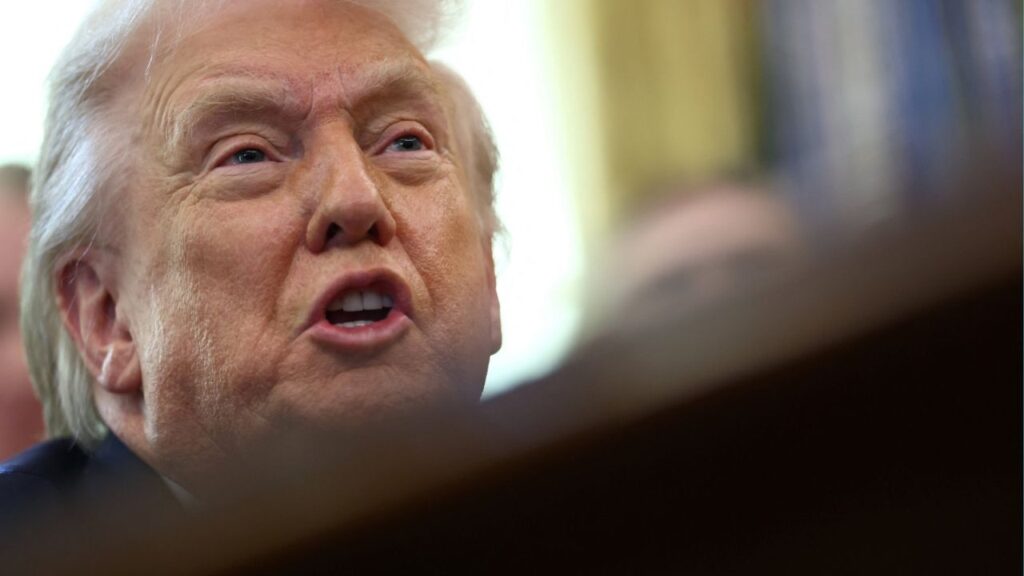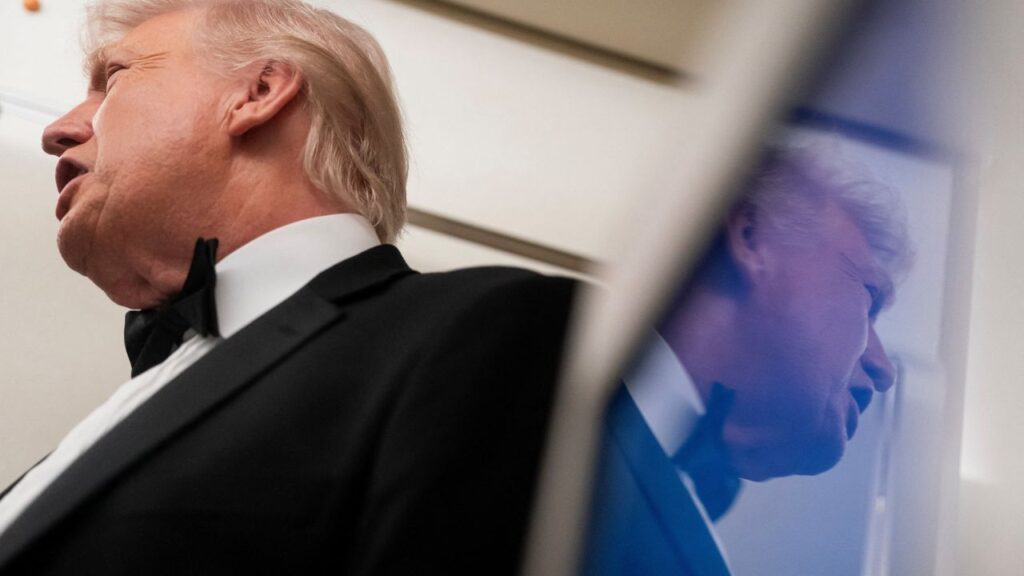Democratic Sen. Kamala Harris, of California, waves to the crowd as she formally launches her presidential campaign at a rally in her hometown of Oakland, Calif., Sunday, Jan. 27, 2019. (AP/Tony Avelar)

- Kamala Harris missed Netanyahu’s Congress address on July 24, attending a sorority event instead, drawing Republican criticism.
- Harris’s absence reflects a shift from Biden’s strong Zionism to a more critical view of Israel’s recent policies.
- Harris is committed to internationalism and a ceasefire in Gaza, but her presidency may face similar challenges with Israel as Biden’s.
Share
|
Getting your Trinity Audio player ready...
|
Kamala Harris’s first show on the world stage as the Democrats’ presumptive new presidential nominee is a disappearing act: on July 24th she will absent herself from an address by Binyamin “Bibi” Netanyahu, Israel’s prime minister, to a joint meeting of Congress. As vice-president, and president of the Senate, Ms Harris would normally oversee the event alongside Mike Johnson, speaker of the House. Instead she will attend a previously scheduled event in Indianapolis to talk to Zeta Phi Beta, a historically black sorority. Republicans, who have come to embrace Israel with ardour, denounced her no-show as “outrageous”.
Related Story: Biden Will Make a Case for His Legacy – and for Harris to Continue It ...
Whatever her reasons, it marks a generational transition. Mr Biden is probably the last Democratic president to call himself a “Zionist”. He is of a generation that remembers the first 30 years of Israel’s existence, as an underdog democracy fighting for survival against Arab enemies, notes Ivo Daalder of the Chicago Council on Global Affairs, a think-tank. “Kamala Harris’s formative view is the last 30 years—of Israel as the dominant power in the Middle East that keeps Palestinians under occupation.”
That is not to say that Ms Harris is about to abandon Democrats’ long-standing support for Israel. Though several Democrats intended to boycott Mr Netanyahu, and anti-Bibi protests were expected outside Congress, Ms Harris is set to meet the prime minister on July 25th (Mr Netanyahu plans to meet Mr Biden the same day, and Donald Trump on July 26th). But though her husband is Jewish, Ms Harris does not show the same emotional attachment to Israel as does Mr Biden, who visited Israel within days of Hamas’s massacres on October 7th, embraced Mr Netanyahu and promised: “The United States stands with you.” More forcefully than Mr Biden, Ms Harris has decried the suffering of Palestinian civilians and pushed for a ceasefire.
Related Story: Did the Harris Entrance Reset the Polling Against Trump?
Ms Harris did not mention foreign policy in her first campaign rally as her party’s presumptive nominee, in Wisconsin on July 23rd. Her CV on foreign affairs was thin at first, and the subject of controversy about her role in trying to deal with the “root causes” of migration from Central America. Indeed Republicans have renewed attacks on her for failing to secure the southern border.
That said, Ms Harris has become somewhat more assured lately, having visited Europe, Asia and Africa, among other regions. Her national security adviser, Philip Gordon, is a veteran of European and Middle Eastern affairs at the State Department and the White House under Democratic administrations. More than 350 former national-security officials, including Democratic Party heavyweights, described Ms Harris as “the best qualified person to lead our nation as Commander in Chief”, with more experience of foreign affairs than most recent incoming presidents.
Ms Harris shares Mr Biden’s internationalism. In February at the Munich Security Conference, an annual talkfest, she warned against American retrenchment under Mr Trump. “Isolation is not insulation. In fact, when America has isolated herself, threats have only grown.”
Related Story: Republican Leaders Urge Colleagues to Steer Clear of Racist and Sexist Attacks ...
But just as she may lack Mr Biden’s love of Israel, she may also not fully share his generation’s instinctive transatlanticism. Unlike Mr Trump, she would not threaten to abandon European allies. But American politicians of all persuasions are increasingly preoccupied with the growing rivalry with China.
Were Ms Harris to win power, notes Aaron David Miller of the Carnegie Endowment for International Peace, another American think-tank, there might be little real change. She will face the same constraints that Mr Obama did in dealing with Mr Netanyahu. The former president may have criticised settlements and pushed for a Palestinian state, but dared not impose his will and even signed a big security deal with Israel. “We rarely use real pressure or leverage on any of our close allies,” says Mr Miller. “And when it comes to the Israelis, because of our domestic politics, that is true in spades.”
Related Story: Biden Will Make a Case for His Legacy – and for Harris to Continue It ...
In his last speech before Congress in 2015, Mr Netanyahu openly opposed Mr Obama’s deal with Iran to limit its nuclear programme in exchange for a partial lifting of sanctions (abrogated by Mr Trump in 2018). This time, with his visit overshadowed by American politics and given the uncertainty over who will become president, Mr Netanyahu was expected to be less confrontational.
Many in the audience will be receptive to his warnings about Iran and its proxy militias. As its nuclear programme advances, Iran is part of an emerging axis of autocracies with Russia, China and North Korea. It has supplied ballistic missiles and drones to Russia for use in Ukraine.
Ms Harris, then, is likely to end up in the same place as Mr Biden: seeking to create a regional counter-axis with Israel and Gulf Arab states, notably Saudi Arabia. For that to happen, though, America is pushing a ceasefire in Gaza with an exchange of Israeli hostages and Palestinian prisoners. These are to be followed by an end to the war, and some progress towards Palestinian statehood, which Mr Netanyahu opposes. In June Mr Gordon set out two paths for Israel. Endless war in Gaza meant “the looming threat of serious regional escalation, and growing Israeli isolation on the world stage”. But America’s phased deal promised “the path to a strong, secure and prosperous Israel; at peace with its neighbours; backed by the United States; and integrated in the region as never before.” Mr Biden will try to land the deal in his remaining time. If he fails, the nettle could become Ms Harris’s to grasp.
Copyright © The Economist Newspaper Limited, 2024
Distributed by The New York Times Licensing Group
RELATED TOPICS:
Categories

Teen Arrested at Visalia Mall After Firearm Report

Tumblr Goes Down for Thousands, Downdetector Reports
















